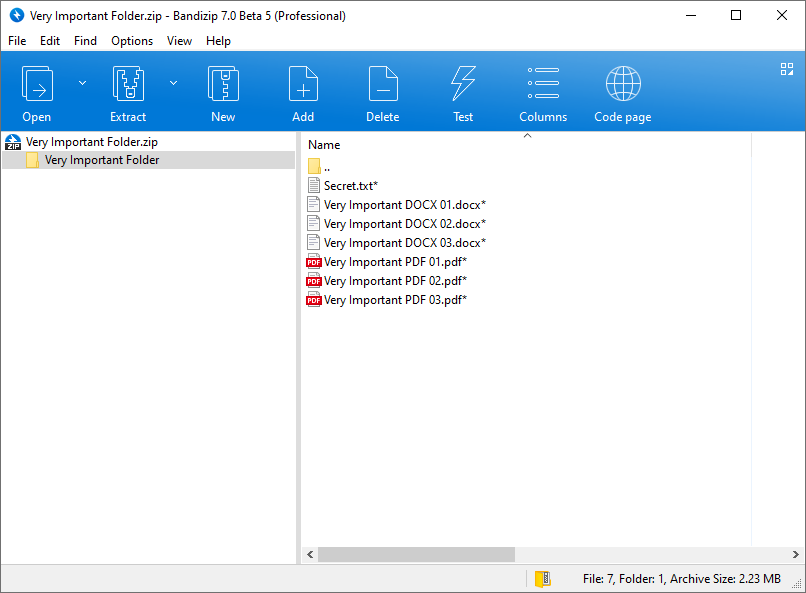

- #7z password doesn install
- #7z password doesn archive
- #7z password doesn registration
- #7z password doesn download
- #7z password doesn free
I feel good knowing that 7-Zip is a free, open source utility that requires no fees or registration to use. 7-Zip's simplicity, speed, compression, and encryption make it a must-have for sysadmins who need those features for your archives. Your directories and files are intact with the proper permissions. Now, untar the tarred files in the usual way.
#7z password doesn archive
Decryptionįirst, decrypt the archive from the compressed, encrypted 7z file and supply your encryption password.
Supporting files with sizes up to 16000000000 GBħz has an open architecture so it can support any new compression methods. Ability to use any compression, conversion, or encryption method. This information is an excerpt from the 7-Zip website.ħz is the new archive format, providing a high compression ratio. I find the man page to be the most accurate and helpful documentation available. My suggestion is always to consult the man page, which should provide the latest information. Not all documentation on the 7-Zip utility is the most up-to-date. $ tar -cf archive.tar archiveħ-Zip 16.02 : Copyright (c) 1999-2016 Igor Pavlov : Here is the interactive version for a directory named archive. $ 7z a -p -mhe=on directory.tar.7z directory.tar Generically, this is my archive and encrypt command: $ tar -cf directory.tar I don't supply any special compression switches, but I do turn on header encryption, and I always supply a strong password (encryption key) for each archive. The following example is my standard one for encrypting a tarball. You should turn on data and header encryption (-mhe=on) so that no one can see your file list in the archive file before entering the password (key). You don't need any extra settings to obtain that encryption level. 7z format are encrypted with AES-256 encryption by default. This installs p7zip, p7zip-plugins, and p7zip-doc from the EPEL repository. #7z password doesn download
I use the * to download every package related to 7-Zip.
#7z password doesn install
To grab the entire suite of 7-Zip plugins and documentation along with the main 7-Zip package, use the following command: # dnf install -y p7zip* Installationħ-Zip isn't a base product, so you'll have to install it. On Linux/Unix, in order to backup directories, you must use tar. On the man page for 7-Zip, you find the following warning:ĭO NOT USE the 7-Zip format for backup purposes on Linux/Unix because 7-zip does not store the owner/group of the file. While 7-Zip's encryption and compression features are good, its backup features are weak. Check the man page for more information on compression settings.

There are several switches and configurations available to obtain different compression levels for your archives.

But this article focuses on encryption rather than compression.
#7z password doesn free
Free eBook: Hybrid cloud strategy for dummiesĭon't forget that 7-Zip is also an excellent compression tool if you want to minimize those backup file sizes. Free course: Red Hat OpenStack technical overview. Encryption, especially AES-256 encryption, helps protect your files and archives from prying eyes, even if they're exfiltrated into a malicious actor's possession. But even if you do, you should encrypt your archives for safekeeping. Hopefully, everyone performs daily backups and follows the 3-2-1 rule of archiving and storage. This article focuses on how you can protect file archives in-flight and at rest with AES-256 encryption. There are three vulnerability points for files and archives when transported or stored: in-use, in-flight, and at rest. I think you'll like its many features, and I'm happy to bring this little gem to light, especially if you've never used it and you're looking for an encryption solution for your backups. It's likely that you've at least heard of 7-Zip somewhere in your travels because it's been around since 1999. It's licensed under the GNU LPGL and other licenses. 
7-Zip is a free, open source, cross-platform compression and encryption utility that neither requires registration or any kind of payment to use, even in a commercial environment.








 0 kommentar(er)
0 kommentar(er)
